the absence was there before the meeting the radical of
presence and absence does not return with death’s chance-
the transcendence of the one translates the other into an everness
we do not meet in heaven, that outward of hell and death’s
beauty it is a bright and terrible disk
where Jack is, where
Charles is, where James is, where Berg is is here in the continuous
carmen O, some things—di—breathe into—aspirate—and lead away—
deducite! for the soul is a thing among many
Berkeley shimmers and shakes
in my mind most lost the absence preceded the place
and the friendships Lady Rosario among us of Spanish and Greek rushes
from the hedges around the gas station,
swirled with Lawrence’s medlars and
sorb-apples
What
is it reminds us of white gods
flesh-fragrant
as if with sweat the delicious rottenness that teems with
the life of the mind’s heart κρατἡρ of an agreement, a mixing vessel,
a chasm, a threshold—Βάθρον—a stair of
brazen steps, hollow wild pear tree—κοίλεο τάχἐρδον
—between among
sat down
I am only leonine in the
breath of night awakening blurred neighbours as your
faces move Jack writing the Italian underground we
are too tired to live like lions on john walls and gay-bars
didn’t laugh at the red Lizard or the Black Cat as your
faces move beyond me suddenly Zukofsky joins the language,
now become larger, sharper, more gathering than the lingo
wherein Berkeley began the movement
the first of your poems
I read: Among my friends love is a great sorrow (brought to me
in typescript by Jack, 1946, that we three should meet)—no voice
like it turns, turns in the body of thought Among
my friends love is a wage/that one might have for an honest living
turns, turns
in thought’s body becomes
O Lovers, I am only one of you!
We, convivial in what is ours!
this ringing
with Dante’s voice before the comedy
is a lion sentinels are owls of work’s body glamouring passages
the poem WHOSE alongside James Hillman’s thought of the heart
Jess tells me you just went, having the heart to whose
heart? I wish to say mine impertinence yours that too
is impertinence nevertheless, always against the heart
failures: cowardice, nostalgia, sentimentalism, aestheticizing, doubt,
vanity, withdrawal, trepidation
fierce, you
name many times this uprising
—political, mental, sexual, social—you name it—mounting rung by
rung
this climax to what overview
under the double ax
whose heart
the lilies burn rose-orange and yellow buds about to,
with a touch of blood near imagination of Blake’s Eternity,
except one would be among them flaming into one another,
not looking out there at the table, the vase, the tall, leafy stems
blossoming
stopped over the ‘Instant Mythology,’ knowing
an old language from you one-inch capsules in the hot water
break at both ends, then burst purple, green, red, blue,
‘pour enfants ages 5 ans et plus, pas comestible, chaque
capsule peut contenir: Centaure, Dragon, Pégase, Licorne,
Sirène—calling—mettez la capsule dans l’eau tiede/chaude
et regardez un caractère mythologique apparaîte’ techo-myth
translates out of the real book into the way language
works regardez!
the travois of the poetic mind,
the drag-load harnessed to the body, firely, through
the glowing flowers warm and hot, the watery spell of
any reel of language poluphloisboíous sea-coast
window-rain is Heimat sunlight travels the fingers
come subito lampo a sudden lamp in the room outside
strikes the fir tree horizon of eyes through passages,
sublime envelopes, and the lives raging within life
There is no exstacy of Beauty in which I will not remember Man’s misery,
compounded by what we have done sighted in ruins, neither old
nor discontinuous
(I smile it is the thought of you a happiness
that could not be without your having been
there
quarrelling)
the permanent wall of our shape the languages
burn and muse the alpha-beta, like the yellow birds
(Dendoica petechia—Parulidae) disappear among spring yellowing leaves,
pricklings, of the holly as its tree renews toward winter robins
and staerlinc wait for red berries where the inkberry is
eastern the cherries are white among the greens, this side
of glass towers with bicycles on the balconies almost rented the bicycle
on the 37th floor and figs like testicles on the branches enjoy
the sexual sun
I remember the quarrel over experience—on Greene Street—
and still think you spoke too soon of a sacred cut-out it was the process
of the actual we were both about
what exactly do we experience in poēsis
over the neat ‘I’ that thinks itself a unity of things or disunity des-
perately untrue to whatever we are tied to—like one’s grief or the smother-
ing domestic realism, or the I-feel, so deep and steeply, no one wants to
listen without a drumhead positivisms of the self
that die into an urn yet, O gratefully / I take the gift of my daily life!
the accusations were: ‘fatuous,’ ‘rhetorical,’ ‘pretentious,’ ‘bourgeois
interior decorator’ (of Pound), continuous writing of the ironing board,
the kitchen, recipes, the jam pots textures, tones, tastes of the world
they are not glabrous, nor is the skin, riding the earth / round into the
sunlight again one wishes the positivities were falling into that Nature
of Me / that includes the cosmos it believes in how curious, not sad, of
all animals, not merely
you came here in 1982 to read Ground Work
up to that point no one could leave the room of cat’s fur, black
stone, and its electric familiar What Is
mind-store mind-change mindful mind-life Eternal
Mind the smile
the burn
not to
want any longer to wait for the thematic release
thinking of you thinking of James Hillman thinking of Corbin—
the idea of a unified experiencing subject vis-à-vis a world
that is multiple, disunited, chaotic. The first person
singular, that little devil of an I—who, as psychoanalysis
long ago has seen is neither first, nor a person, nor
singular—is the confessional voice, imagining itself
to be the unifier of experience. But experience can only
be unified by the style in which it is enacted, by the images
which formed it, by its repetitive thematics, and by the
relations amid which it unfolds. It does not have to be
owned to be held. The heart in the breast is not your
heart only: it is a microcosmic sun, a cosmos of all
possible experiences that no one can own
against heart
failures
I gather as I must images of independent realities I,
subjected to the gaze of things, as I think of you
as you say the etymology is false,
bringing the core,
care—κἡρ—κἡρ together the heart and the goddess, who
is κἡρες plural among things thinking of you thinking of
Hillman thinking again, Beauty is an epistemological necessity thinking of
a sudden call to climb the ladder of which you
did not mean because it does not mean, though
it is recited ‘Never’ being the name of what is infinite
of cross-ways
of brazen
steps
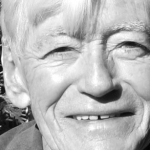






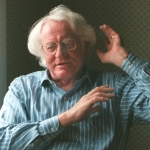
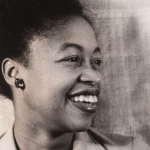
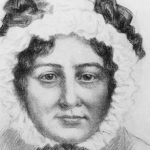
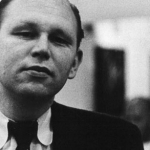


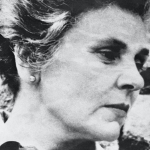






Comment form: